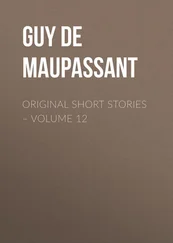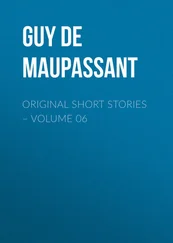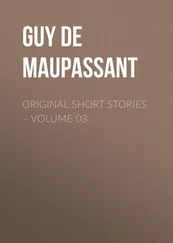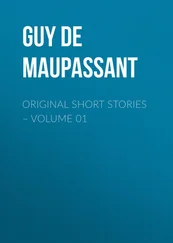All Monsieur Patissot's chivalric instincts were wounded and he declared:
"You are not a Frenchman, monsieur. French gallantry is a form of patriotism."
Monsieur Rade retorted:
"I have very little patriotism, monsieur, as little as I can get along with."
A coolness settled over the company, but he continued quietly:
"Do you admit with me that war is a barbarous thing; that this custom of killing off people constitutes a condition of savagery; that it is odious, when life is the only real good, to see governments, whose duty is to protect the lives of their subjects, persistently looking for means of destruction? Am I not right? Well, if war is a terrible thing, what about patriotism, which is the idea at the base of it? When a murderer kills he has a fixed idea; it is to steal. When a good man sticks his bayonet through another good man, father of a family, or, perhaps, a great artist, what idea is he following out?"
Everybody was shocked.
"When one has such thoughts, one should not express them in public."
M. Patissot continued:
"There are, however, monsieur, principles which all good people recognize."
M. Rade asked: "Which ones?"
Then very solemnly, M. Patissot pronounced: "Morality, monsieur."
M. Rade was beaming; he exclaimed:
"Just let me give you one example, gentlemen, one little example. What is your opinion of the gentlemen with the silk caps who thrive along the boulevard's on the delightful traffic which you know, and who make a living out of it?"
A look of disgust ran round the table:
"Well, gentlemen! only a century ago, when an elegant gentleman, very ticklish about his honor, had for—friend—a beautiful and rich lady, it was considered perfectly proper to live at her expense and even to squander her whole fortune. This game was considered delightful. This only goes to show that the principles of morality are by no means settled—and that—"
M. Perdrix, visibly embarrassed, stopped him:
"M. Rade, you are sapping the very foundations of society. One must always have principles. Thus, in politics, here is M. de Sombreterre, who is a Legitimist; M. Vallin, an Orleanist; M. Patissot and myself, Republicans; we all have very different principles, and yet we agree very well because we have them."
But M. Rade exclaimed:
"I also have principles, gentlemen, very distinct ones."
M. Patissot raised his head and coldly asked:
"It would please me greatly to know them, monsieur."
M. Rade did not need to be coaxed.
"Here they are, monsieur:
"First principle—Government by one person is a monstrosity.
"Second principle—Restricted suffrage is an injustice.
"Third principle—Universal suffrage is idiotic.
"To deliver up millions of men, superior minds, scientists, even geniuses, to the caprice and will of a being who, in an instant of gaiety, madness, intoxication or love, would not hesitate to sacrifice everything for his exalted fancy, would spend the wealth of the country amassed by others with difficulty, would have thousands of men slaughtered on the battle–fields, all this appears to me—a simple logician—a monstrous aberration.
"But, admitting that a country must govern itself, to exclude, on some always debatable pretext, a part of the citizens from the administration of affairs is such an injustice that it seems to me unworthy of a further discussion.
"There remains universal suffrage. I suppose that you will agree with me that geniuses are a rarity. Let us be liberal and say that there are at present five in France. Now, let us add, perhaps, two hundred men with a decided talent, one thousand others possessing various talents, and ten thousand superior intellects. This is a staff of eleven thousand two hundred and five minds. After that you have the army of mediocrities followed by the multitude of fools. As the mediocrities and the fools always form the immense majority, it is impossible for them to elect an intelligent government.
"In order to be fair I admit that logically universal suffrage seems to me the only admissible principle, but it is impracticable. Here are the reasons why:
"To make all the living forces of the country cooperate in the government, to represent all the interests, to take into account all the rights, is an ideal dream, but hardly practicable, because the only force which can be measured is that very one which should be neglected, the stupid strength of numbers, According to your method, unintelligent numbers equal genius, knowledge, learning, wealth and industry. When you are able to give to a member of the Institute ten thousand votes to a ragman's one, one hundred votes for a great land–owner as against his farmer's ten, then you will have approached an equilibrium of forces and obtained a national representation which will really represent the strength of the nation. But I challenge you to do it.
"Here are my conclusions:
"Formerly, when a man was a failure at every other profession he turned photographer; now he has himself elected a deputy. A government thus composed will always be sadly lacking, incapable of evil as well as of good. On the other hand, a despot, if he be stupid, can do a lot of harm, and, if he be intelligent (a thing which is very scarce), he may do good.
"I cannot decide between these two forms of government; I declare myself to be an anarchist, that is to say, a partisan of that power which is the most unassuming, the least felt, the most liberal, in the broadest sense of the word, and revolutionary at the same time; by that I mean the everlasting enemy of this same power, which can in no way be anything but defective. That's all!"
Cries of indignation rose about the table, and all, whether Legitimist, Orleanist or Republican through force of circumstances, grew red with anger. M. Patissot especially was choking with rage, and, turning toward M. Rade, he cried:
"Then, monsieur, you believe in nothing?"
The other answered quietly:
"You're absolutely correct, monsieur."
The anger felt by all the guests prevented M. Rade from continuing, and M. Perdrix, as chief, closed the discussion.
"Enough, gentlemen! We each have our opinion, and we have no intention of changing it."
All agreed with the wise words. But M. Rade, never satisfied, wished to have the last word.
"I have, however, one moral," said he. "It is simple and always applicable. One sentence embraces the whole thought; here it is: 'Never do unto another that which you would not have him do unto you.' I defy you to pick any flaw in it, while I will undertake to demolish your most sacred principles with three arguments."
This time there was no answer. But as they were going home at night, by couples, each one was saying to his companion: "Really, M. Rade goes much too far. His mind must surely be unbalanced. He ought to be appointed assistant chief at the Charenton Asylum."
A Recollection
How many recollections of youth come to me in the soft sunlight of early spring! It was an age when all was pleasant, cheerful, charming, intoxicating. How exquisite are the remembrances of those old springtimes!
Do you recall, old friends and brothers, those happy years when life was nothing but a triumph and an occasion for mirth? Do you recall the days of wanderings around Paris, our jolly poverty, our walks in the fresh, green woods, our drinks in the wine–shops on the banks of the Seine and our commonplace and delightful little flirtations?
I will tell you about one of these. It was twelve years ago and already appears to me so old, so old that it seems now as if it belonged to the other end of life, before middle age, this dreadful middle age from which I suddenly perceived the end of the journey.
I was then twenty–five. I had just come to Paris. I was in a government office, and Sundays were to me like unusual festivals, full of exuberant happiness, although nothing remarkable occurred.
Читать дальше












